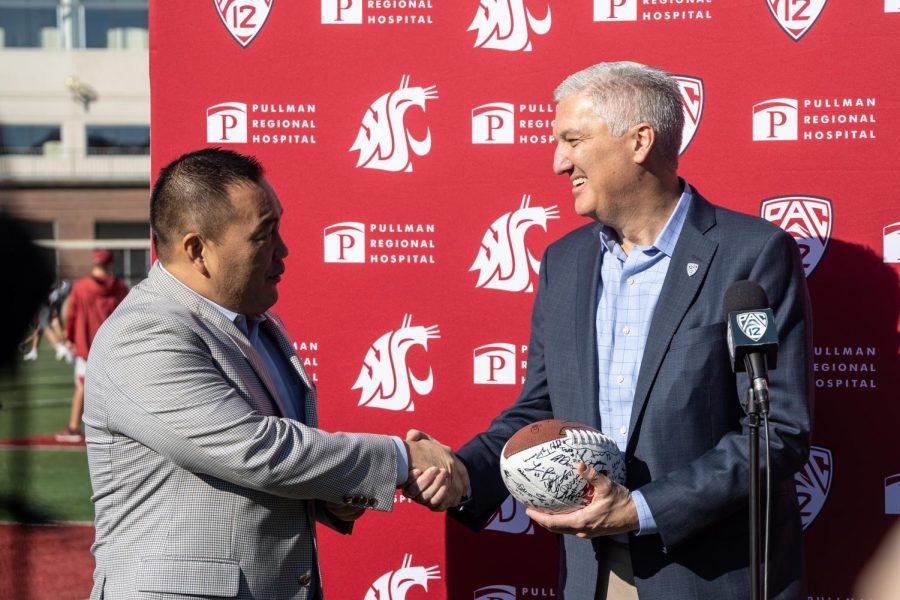USC, UCLA to leave Pac-12 Conference, join Big Ten in 2024
College sports on cusp of major change, WSU faces major decision
July 1, 2022
For college sports fans, the sky is falling.
The USC Trojans and UCLA Bruins announced Thursday they plan to leave the Pac-12 conference and join the Big Ten conference in 2024.
On Friday, the Pac-12 released a statement saying the 10 remaining institutions remain committed to a shared mission of academic and athletic excellence.
While this statement is necessary from a PR standpoint, the possibility of more schools leaving the Pac-12 remains.
WSU and the rest of the conference have gone into survival mode. The departure of two of the most reconginzable schools and the No. 2 TV market in the U.S. leaves traditions like classic conference rivalries and the Rose Bowl in jeopardy and even less revenue for a conference that was already struggling.
The Pac-12’s current media rights deal expires in 2024. Unfortunately, USC and UCLA saw the Big Ten deal as far more lucrative than any potential Pac-12 deal could be.
The addition of the L.A. schools to the Big Ten means a potential media negotiation with Apple could be back on the table. The conference could be raking in over $1 billion dollars a year.
In 2019, the Big Ten gave out around $55 million to each of their 12 teams in the conference while the Pac-12 gave out around $32 million to each of their 12 teams. In 2021, the Big Ten schools got around $49 million dollars and the Pac-12 schools got around $20 million per school, according to USA Today.
As the business of college sports distances itself from the challenges of the pandemic, pre-pandemic revenues and potential growth are on the horizon for the Big Ten and SEC. The extra $25 million or so in athletic revenue earned by membership in the Big Ten could help greatly reduce UCLA’s steep $62.5 million debt as of January 2022.
The reason the Pac-12 earned dramatically less revenue than the Big Ten and other conferences in 2021 can be traced back to shortcomings in media rights. The Pac-12 reportedly turned down an offer from ESPN to broadcast Pac-12 games in favor of carrying most games on their own Pac-12 Network, according to the Sports Business Journal.
With fewer nationally televised games, the conference saw a substantial hit to its overall revenue while conferences like the Big Ten and SEC thrived.
This was ultimately the fault of former Pac-12 commissioner Larry Scott, who applied this media strategy for far too long. Scott was fired by the Pac-12 school presidents in January 2021.
The abrupt departure of the L.A. schools occurred one day before the current conference commissioner George Kliavkoff’s one-year anniversary on the job.
While Kliavkoff’s year on the job has been largely successful with both men’s and women’s Pac-12 basketball tournaments happening in Las Vegas and the addition of the first conference baseball tournament in Arizona. However, the fact that these events were largely contained to the Pac-12 Network did little to help the conference’s national visibility and relevance.
WSU, like every Pac-12 school, loses trips to L.A. to play the Trojans and Bruins and could lose two of the top teams in the Pacific Northwest in most athletic programs, in Oregon and UW.
The Ducks are a huge athletic university, drawing in many out-of-state talents to join the school with state-of-the-art athletic facilities, coaches and programs.
The Huskies are normally dominant in football and produce enough in basketball and other sports to draw attention from other conferences. The success of Oregon and UW elevated the Pac-12 and could elevate any conference they may join.
The stronger WSU’s opponents are, the stronger WSU ultimately is in the metrics that matter for recruiting: the ability to win meaningful games and contend for Division-I championships.
The departure of the L.A. schools impacts the Cougs in more sports than just football. USC and UCLA have traditionally been at or near the top of the conference in basketball, as well as track and field. Women’s basketball will take a hit as UCLA is in the top half of the conference. For baseball, the Cougs lose an opponent in UCLA who finished third in the conference last season.
Coaches that came to WSU as their first Power 5 conference job such as Kyle Smith, men’s basketball head coach and Kamie Ethridge, women’s basketball head coach suddenly may see their job as less prestigious based on the quality of WSU’s opponents.
However, basketball, volleyball and soccer are best positioned for sustained success without the Pac-12 if they build and expand upon reputations as NCAA tournament regulars.
The recruiting side will take a hit as more athletes could rule out WSU based on the opportunities and options to join other teams in the Big Ten and South East Conference.
With the addition of USC and UCLA, the Big Ten conference will have 16 teams total. The total will match the SEC once Texas and Oklahoma officially make their move from the Big 12 to the SEC in 2025.
After the Longhorns and Sooners left the Big 12, the conference was down to eight teams. However, after adding BYU, UCF, Houston and Cincinnati, the Big 12 looks like it will survive.
With schools leaving the Pac-12, there are also schools that the conference could try and recruit. The first schools that come to mind are: San Diego State, Boise State and Colorado State. Each are currently members of the Mountain West Conference and are arguably the top three teams in the conference for athletics.
The San Diego State Aztecs were ranked in the top 25 in both football and basketball at one point last season. The Boise State men’s basketball team made the March Madness tournament last season. While the Colorado State Rams saw a basketball season where they went 25-6 and made it to March Madness as well.
Although these teams are not the powerhouses that USC and UCLA are, they could bring in enough talent and revenue to keep the conference both competitive and afloat while it works out how to navigate the seasons to come.
With the L.A. schools leaving and revenue greatly reduced, the Pac-12 as we know it seems to be nearing an end. What WSU chooses to do next will impact its national and regional relevance.











